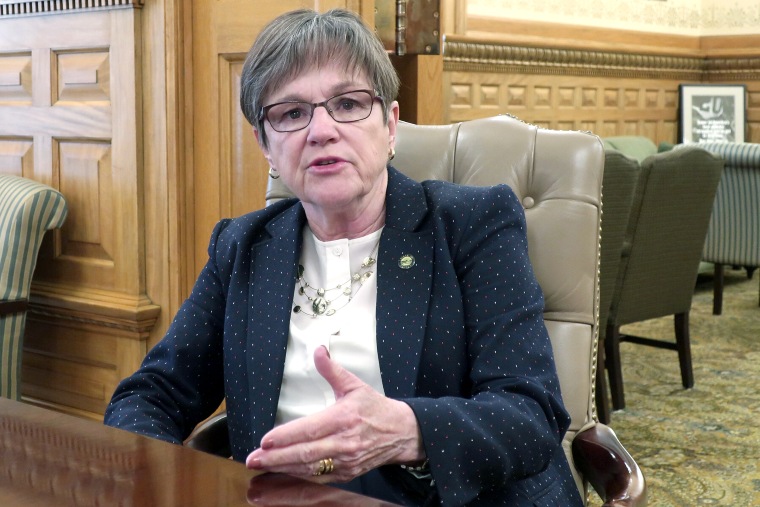Kansas Gov. Laura Kelly, a Democrat, and Sen. Jim Denning, the state’s top Senate Republican, announced Thursday that they had come to an agreement on Medicaid expansion, which would provide the state’s working poor access to health care coverage.
Though the announcement was not a bill signing, Kelly said that Denning, the senate majority leader, had endorsed her plan to expand Medicaid to provide health care coverage to more than 100,000 people in the state.
The state legislature will still have to pass the bill, which is highly likely now with Denning's endorsement. Kelly said the intention is for the legislation to be passed over the next year, so that Kansans can take advantage of the program by Jan. 1, 2021.
“Today, I am proud to stand with Sen. Denning to announce we have taken a crucial bipartisan step toward making Kansas the 37th state to expand Medicaid,” Kelly said.
Medicaid expansion first became available almost a decade ago under the Affordable Care Act. Fourteen states including Kansas, however, had refused to accept money from the federal government, which now pays 90 percent of the expanded program.
Critics maintained that it would ultimately cost states too much to expand the program, while advocates insisted these states were leaving money on the table, causing its residents to take on unreasonable amounts of medical debt and endangering hospitals' financial health.
Kelly's plan increases Kansans' Medicaid eligibility to 138 percent of the federal poverty level, works to defray costs through a surcharge on hospitals, and includes a work training and placement program that is less stringent than the work requirements that many Republicans desired.
It also will create an easy escape hatch for Kansas in case the federal government chooses to no longer provide 90 percent of the funding for Medicaid expansion and also moves forward with a program to help insurance programs provide cheaper health care on the federal exchange.
“Kansas will not repeat the mistakes made in other states where expansion plans were loaded up with bureaucratic red tape, expensive and administrative barriers, and hundreds of millions of dollars in wasted taxpayer money,” Kelly said, noting that the bill included elements of her own plan, as well as proposals made in both chambers of the state Legislature.
Denning, once considered a strong expansion opponent after he stopped a Kansas House expansion bill last year, said Thursday that his main interest was in helping Kansans.
“My top priority is to lower the cost of health care for Kansans across the board,” the senator said.
Approximately 130,000 Kansans are expected to enroll when the expanded Medicaid program becomes available, according to an estimate by the Kansas Health Institute, at a net cost of $520 million over 10 years.
Advocates for expansion have pointed out that there is a need for the program.
From financial years 2012 to 2018, the average number of state residents receiving medical assistance grew by 44,000, to include 267,032 families, according to a report by the Kansas Governor’s Council on Medicaid Expansion published in September.
The report studied Montana’s choice to expand Medicaid in 2015 with bipartisan support. Since then, the uninsured rate has cut nearly in half and nearly 1 in 9 Montanans had access to health care through expansion coverage, saving the state approximately $30 million a year.
It also examined Ohio’s experience with expansion, noting that after an initial growth in Medicaid costs, the impact began to flatline and led to a large decline in the uninsured rate to the lowest on record and a growth in recipients’ ability to go to work or find work.
This latest announcement comes amid a flurry of activity to expand Medicaid in states that still have not pursued it.
Residents in Idaho, Nebraska and Utah voted to expand Medicaid in 2018 through ballot initiatives, and Oklahoma and Missouri are expected to vote on the same issue at the end of the year.
Kelly said this fulfilled one of the promises that helped her win the governor’s mansion last year in a conservative state.
“I pledged that I would work across the aisle to ensure that partisanship never stands in the way of progress," she said. "There is no clearer example of that commitment than the proposal that Sen. Denning and I will offer today.”



